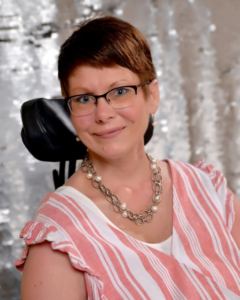by Lynn Stevens, Bossier City, Louisiana

About 10 years ago, the progression of FSHD on my body forced me to begin evaluating whether I should continue trying to work full-time or consider what was next for me. I couldn’t imagine sitting on the sidelines, as this was not in my DNA (pun intended).
But after several bad falls ─ one that resulted in an ambulance ride and having to get my teeth put back in and my mouth wired shut ─ I had to face a grim reality. Until then, I had tried to ignore what was happening, mostly because I was scared to admit that I was at this point, and I had bills to pay. I couldn’t just stop working, but what were the alternatives?
It actually took me a long time to get to where I am today. I could have just reduced my hours or my job duties and responsibilities, but that was not me. I was raised by a Marine dad who instilled the “never give up” mentality.
Instead, I used the resources with my employer at the time, the United Way, to help me. Being connected to this large umbrella community organization, I tapped into the resources in our own lobby to find what options I may have.
Resources for people who want to keep working
Our office often referred disabled individuals to the local Rehabilitation Services office. Every state has its own version that offers vocational services free of charge to those who apply and are eligible. Every state has different eligibility requirements and funding levels. This is all I really knew about the services or programs it offered. After facing my fears of admitting that I needed help, I made the call.
I learned that, because I wanted to keep working, there were resources that I qualified for immediately, including help securing a wheelchair and funding to convert our van. They even did a home and workplace assessment, and helped me purchase items for my house and for my employer to better accommodate my ability to continue in my current position.
It wasn’t all roses, though. It was a painstakingly slow process, taking more than a year for me to get the help I needed. I learned more about self-advocacy than I had in more than 20-plus years of having FSHD. But I did get the help I needed at the right time in my life.
About a year ago, I started facing a new battle: severe fatigue. It started to impact everything ─ my work, social contacts, and quality of life. Again, I was forced to face facts. It was time to reduce my hours or quit working. Unfortunately, as the chief operating officer at United Way, I didn’t have the option of reducing my hours. But I really didn’t want to stop working. So now what?
Landing my dream job
One of my final projects with the United Way was helping to write a collaborative grant in partnership with Goodwill Industries. Even though I was an avid shopper at Goodwill, I never thought it would present a career opportunity that would become the next chapter in my life.
Goodwill Industries works to enhance people’s dignity and quality of life by strengthening communities, eliminating barriers to opportunity, and helping individuals reach their full potential through the power of work. The Goodwill network represents 157 community-based organizations in the US and Canada, with a presence in 12 other countries.
Each of the independent, local Goodwill organizations designs its own programs and services to employees, and helps people find work where they live. All of them offer programs and services for individuals with disabilities. And even though the United Way had funded them for years, this is something I never knew.
Since October of last year, I have had the pleasure of working as the director of Workforce Development – a role I have loved since day one. Because the organization is about serving those with disabilities and disadvantages, I have never feared my disability or how it affects my employment. Our CEO is very understanding and has worked hard to make sure everything I need is available. The best things about this role are the satisfaction I get every day helping others achieve their employment goals – whatever that looks like for them – and helping to educate employers on how to work with the disabled and advocate for community-wide changes.
Many of us have or will have to face the same decision at some point in our lives. You are not alone – that is the most important thing you need to remember. You also have to find what works for you. There are help and programs out there for you, no matter where you live.
Lynn Stevens is the director of Workforce Development for Goodwill Industries of North Louisiana and has been serving the nonprofit sector for more than 20 years. She has used her experience and leadership skills to help guide and direct many types of local, regional, and national organizations.
Resources to help you find a job
State Vocational Rehabilitation Programs
Directory of Centers for Independent Living and Associations
Office of Disability Employment Policy: State Liaisons


This is a very encouraging story. Thank you for sharing it.
You are an amazing person and a great friend!